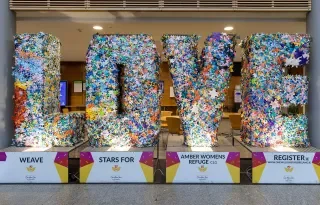Microplastics found in high levels on Dundalk Bay beaches and in shellfish
A new study has revealed high levels of microplastics in Dundalk Bay, with the tiny plastic particles found in both the sand and shellfish. The research, led by Dr. Stephen Kneel from Dundalk Institute of Technology (DkIT), highlights the growing environmental threat posed by microplastics in this Special Protected Area (SPA).

The study, published in the Marine Pollution Bulletin, examined common cockles and beach sand in Dundalk Bay. Microplastics, commonly reported as plastic particles less than 5mm in size, are a growing concern due to their potential impact on both the environment and human health. Recent research has even found microplastics in human arterial plaque and linked them to an increased risk of heart attacks and strokes.
Dr. Kneel’s research, conducted under DkIT’s Dr. Suzanne Linnane and Dr. Caroline Gilleran Stephens, in conjunction with NUIG’s Dr. Liam Morrison, and Dr. Ana Mendes, found that 98.6% of the shellfish tested contained microplastics. The types of plastic found in the shellfish were more varied than those found in the surrounding sand, suggesting that cockles are not only filtering out natural nutrients but also small plastic debris from the water.
This finding is particularly concerning because Dundalk Bay is an important wintering site for seabirds, many of which rely on cockles as a food source. The study’s authors warn that microplastics could be making their way up the food chain with their presence potentially affecting the wider ecosystem.
The research also points out that, contrary to the popular belief that microplastics are small plastic beads, the majority of the microplastics found (approximately 70% for cockles and 80% for beach sand) were in the form of microfibres—tiny threads that shed from synthetic fabrics like polyester and nylon. These fibres are more likely to escape into the environment through wastewater and be ingested by filter-feeding shellfish.
The study underscores the growing environmental threat posed by plastic pollution, which continues to accumulate in marine environments due to the overuse of plastic products and inadequate waste management. Dundalk Bay’s shallow waters may be contributing to the higher concentration of microplastics in the area, researchers say.
The overconsumption of plastic products coupled with insufficient waste-management is leading to their loss into the natural environment, as seen by the large quantities found in shellfish and sand in Dundalk Bay. More action is needed to tackle plastic pollution and protect vulnerable ecosystems.



